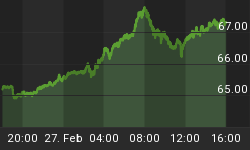Funny how some rituals persist long after their original point is forgotten. Take the federal debt limit, that relic of a time when lawmakers were actually embarrassed about piling debt onto our kids. Nothing embarrasses these guys any more, of course, and the annual process of raising the limit has devolved from tragedy to farce, with Treasury threatening to bounce Social Security checks (secure in the knowledge that it will never have to) and legislators pontificating on fiscal responsibility (certain that their pork won't be touched), followed by a quiet vote to raise the bar by another half-trillion.
That was last week. Now comes the usual round of media hand-wringing, to which the don't-worry-be-happy crowd will respond as it always does, with the observation that America's "national debt" is no higher -- and in some cases a lot lower -- than that of other countries. Get ready to see variations of the following chart in the Wall Street Journal and on CNBC:

Viewed this way, Washington's obligations actually do look pretty manageable. If we're doing as well as Germany and better than Japan, how bad can it really be? Well, it can be very bad indeed, because the "national debt" in the above chart refers only to direct obligations of the federal government, and government doesn't have to borrow to finance itself with debt. Consider: If the Fed lowers interest rates and liberalizes lending rules enough to convince me to build my dream house, I go out and borrow, say, $500,000, which generates taxable income for my mortgage banker and her support staff. Then I hire a contractor and crew, who spend six months earning good money and paying taxes. Then I furnish the house and landscape the yard, generating taxable income for furniture makers and gardeners. Government, by encouraging me to borrow, has pocketed tens of thousands of dollars that it doesn't have to borrow for itself.
Now, at this point an astute reader might say, "Ah, but there's a difference between a mortgage held by a bank and a bond issued by the Treasury. If you default on your mortgage, only the bank and its shareholders have a problem. This is private, not 'national' debt."
Not so long ago, this would have been true. But no more. To understand why, let's contrast yesterday's banking practices with today's New Age securitization machine. Back in, say, 1986 a bank that wrote a mortgage generally held onto it, collecting the monthly payments and netting them against the borrowing necessary to fund the loan, earning a profit on the difference. If a borrower defaulted, the problem was indeed strictly private-sector, impacting the bank and its owners but not the general public.
But that quaint arrangement is history, thanks to the emergence of Fannie Mae and Freddie Mac. These "government-sponsored enterprises," or GSEs, were created decades ago by Washington to buy mortgages from banks, thus giving banks a little extra cash to lend to would-be homeowners. And for a long time, they stuck pretty much to their original charter, buying modest numbers of mortgages and helping banks fund modestly greater numbers of home purchases. But in the 1990s they had an epiphany: What they could do on a small scale, they could also do on a vast scale, making easy fortunes for their execs and shareholders in the process. They started buying literally trillions of dollars of mortgages from banks. Then they packaged them into bonds, slapped a guarantee on them (giving the bonds AAA ratings) and sold them to global investors for a nice profit. Then they started borrowing at really low rates (possible since everyone thinks they're part of the government) to buy back portfolios of these same bonds, earning the spread between the bond yields and the GSEs' borrowing costs.
Fannie and Freddie between them now own and/or insure about $4 trillion of mortgage debt, which means trouble at either would cause a financial earthquake. Picture a scenario in which a derivatives accounting problem costs a GSE its AAA rating, which causes all the bonds it has insured to fall, which lowers the value of its bond portfolio, which cuts its credit rating even further, and so on, in a death spiral that takes the whole global financial system along for the ride. No government that wants to stay in power will allow this to happen, which means that Fannie and Freddie are officially too big to fail, and taxpayers are on the hook for their liabilities.
We've seen this movie before, by the way. Back in the 1980s, easy money and lax regulations (the Feds actually encouraged S&Ls to buy junk bonds) allowed the junk bond market to inflate into a full-scale bubble. When it burst, those supposedly private sector bonds bankrupted thousands of S&Ls, which the government bailed out to the tune of several hundred billion dollars.
This time around the amount of money directly at stake is maybe twenty times as large. But that's just the beginning. Because the value of the bonds Fannie and Freddie own and insure depends on the behavior of mortgages in general, you can make the case that taxpayers are now on the hook for the whole $10 trillion mortgage market. Viewed this way, the "national debt" doesn't look nearly so benign.
















